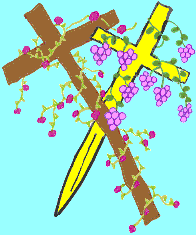
Neither before nor after Josiah was there a king like him who turned to the LORD as he did--with all his heart and with all his soul and with all his strength, in accordance with all the Law of Moses. (2 Kings 23:25, NIV)
Who was the greatest king of the Israelites? Was it David, the sweet psalmist and shepherd of Israel? Or Solomon, the wisest man in history? Both were extraordinary, but neither was commended by God as highly as Josiah. Josiah? Who was he?? Only a lame-duck king of Judah who reigned after Israel's sin had sealed her own doom. According to the Bible, Josiah served the Lord the most faithfully of all the kings of Israel. And not coincidentally, Josiah’s life and death most clearly anticipate the redemptive ministry of Jesus the Messiah.
The life and death of Jesus may be seen in many aspects of Josiah's life, as follows.
Hundreds of years before Josiah's birth his name and ancestry were predicted, and his destruction of the idols at Bethel was foretold (1 Kings 13:2). These predictions are a foretaste of the remarkable prophecies of the Messiah, some of which predated Jesus’ birth by thousands of years.
When Josiah became king, the book of the Law had been lost. When Josiah was in his twenties, the book of the Law was rediscovered the people's hearts were turned back towards God. Similarly, in Jesus’ time, though the letter of the Law was well known, the spirit of the Law had been lost. But when Jesus was in His twenties, the spirit of the Law was rediscovered through the preaching of John the Baptist. Once again the people’s hearts were turned back towards God.
After rediscovering the Law, King Josiah organized a Passover celebration which was unique in all the history of Israel (2 Chronicles 35:18). But very soon afterwards, this king who had authored such a special Passover became a lamb for the slaughter himself, for Josiah was killed in battle by the Egyptians. Just so Jesus, who was the true Passover lamb, was slaughtered immediately after sharing the Passover bread and wine with His disciples.
The circumstances of Josiah's death have prophetic significance. Josiah died while fighting against Pharaoh the ruler of Egypt. This also points towards the Messiah, for Jerusalem the place of Jesus’ death is spiritually called "Egypt", because of its sin (see Revelation 11:8, Galatians 4:25 and Genesis 16:1). Josiah was killed at Megiddo, whose name is derived from a Hebrew word which means both "to gather in crowds" and "to penetrate or cut". Jesus was also killed at a "place of crowds", for Jews from all over the world had gathered to celebrate the Passover. “Penetration” also has an obvious connection to Jesus’ death, for His hands, feet and side were all pierced.
After Josiah died, his three sons became king, one after another. Sadly, none of them followed in his way, all turned aside to unrighteousness. In the same way, when Jesus died the leaders of the Jews did not repent, but persisted in pride, greed, and self-righteousness.
Since Josiah’s death is a prophetic forbear of Jesus’ death, we should not suppose that Josiah was killed because he was disobeying God. It is true that Pharaoh spoke in God's name when he warned Josiah not to fight: but so had other pagan kings who had attacked Israel (see Isaiah 36:10). Rather, God set Josiah up to fail. God took him away so that he would not have to endure the humiliation and exile which was the inevitable consequence of Israel's sin (2 Chronicles 34:28) . But in Josiah's death lay the hope of Israel, and our hope as well. For God does not slay the righteous along with the wicked (Genesis 18:25). Josiah's death confirms the promise of the resurrection: He will not let His dedicated servant lie forever in the grave (Psalm 16:9-10).
Josiah's life reveals to us a precious truth. God sets His righteous ones up to fail -- not all, but only the most exceptional, those who are the most Christlike. This failure is not punishment for their sins, but rather the consequence of others' sins. The apparent failure of the righteous is God's most powerful means for working redemption and restoration for those who have strayed far from Him.
Prayer:
Father,
forgive me for adopting the world's measure of accomplishment and success.
Please remove from me the dread and shame of failure. If you count
me worthy and call me to fail for Your sake, then help me to joyfully embrace
Your call. I pray in the name of Your Son Jesus, who endured the
ultimate shame and failure of the Cross to rescue me from Satan's grip
and restore me to Your family.